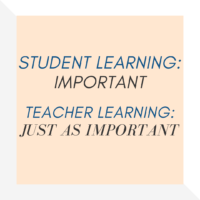Designing Adult Learning to Model the PBL Process
By Jennifer Pieratt
Some “literacy experts” have said that “teachers teaching teachers is like the blind leading the blind.” While this isn’t necessarily true, we’ve definitely all endured many long, uninspiring professional development sessions. In fact, while we may champion project-based learning for our students, teachers primarily get stuck in lecture-based rather than project-based learning training workshops. It is time we care just as much about teacher learning as we do about student learning, and make project-based learning training workshops dynamic and energizing for educators. To do this, we need to practice what we preach by designing adult learning to model the PBL process… and that starts with the creation of a project-based learning Problem of Practice (PoP) leading to a Theory of Action (ToA).
Wait, what exactly is a PoP? It’s not only a problem related to teacher practices, it’s one that “focuses on the instructional core, is directly observable, is actionable, and connects to a broader strategy of improvement” according to UC Davis School of Education. In other words, it’s honing in on an identifiable problem, such as student collaboration. For instance, if students face difficulties conducting research together, then teachers should work together to reflect on the ideal outcome and brainstorm tailored solutions, as shown in CraftEd’s collaborative research method, weSEARCH. Once that’s done, it’s time to come up with a ToA, a map or storyline that will help concretize the chosen strategy. It’s important to explain that a Theory of Action involves a causal relationship in your project-based learning training workshops. Facilitators need to think in the following way: “if students are ___, and we do ___, then ___ will happen.” This helps teachers act with intention and foresight. Note that ToAs are always subject to revision. In fact, we could even say they are meant to change in light of new evidence in the classroom.
When it comes to using PoP and ToA in project-based learning training workshops, the trick is to focus on collective reflection. It’s best to use these methods in professional learning communities (PLCs) – groups in which professionals come together to learn. This generally consists of a few educators who meet regularly to improve their teaching skills with their class’ academic performance in mind. One key issue with PLCs is that they tend to lack interdisciplinary thinking or creative crossovers between grades. However, if you can’t mix teachers from different backgrounds together, implementing PoP and leveraging ToA can at least make these encounters more meaningful as educators can brainstorm together and share ToA ideas that might work across different environments. Moreover, school or district development programs can also benefit from this collaborative idea-sharing for actionable development. To deepen the reflection process, encourage all educators to ask probing questions. You can also try the NUF Test Gamestorm, in which you test every solution proposal according to how useful, how feasible, and how inventive the idea is. Tally the results ranging from 1 to 10 for each idea. PoP into ToA is the key to making these goal-driven exchanges dynamic, stimulating, and purposeful.
You can find more detailed explanations of how the PoP into ToA approach can be used in my e-courses here. Take the time to read through a few articles on Teaching Channel, a great resource for all self-reflective educators and professional learning communities. For example, in one of their blog posts, Jessica Keegan zeroes in on a very common problem in many project-based learning training workshops: lack of focus. When you first learn about PoP and ToA, it may be tempting to try to apply them to every problem thrown your way, when you would gain more time to spemd developing solutions to a single issue. PoP and ToA are also beneficial to use as follow-up for leadership practices as I implemented with project-based learning training workshops at Calavera Hill Middle School.
Teachers, every bit as much as students, should be driven by their curiosity rather than by compliance when they learn. Indeed, if research into educational methods has proven that learning is more fulfilling when it is engaging, challenging, and purposeful, why wouldn’t we hold ourselves accountable to the same standards with all learners, regardless of whether they are teachers or students? To integrate Problem of Practice and Theory of Action into project-based learning training workshops is to acknowledge that educators should be just as reflective as students. PoP into ToA is about addressing all challenges our students may encounter, whether these have already occurred, are an issue now, or may arise later on. You can learn more about how PBL methods can make learning more authentic for all learners here.


